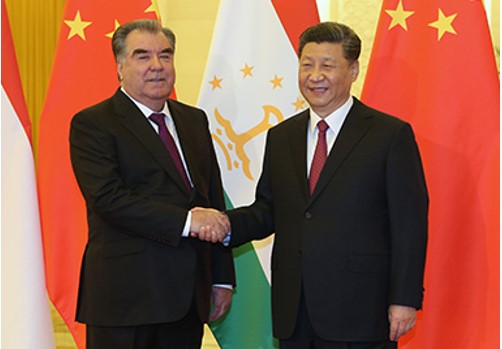This past week, Tajikistan and China discussed the outcome of the 30th anniversary of diplomatic relations, outlining a plan for further cooperation; The Chinese president took the upper hand at the SCO summit as Central Asian countries move closer to China and further away from Russia; The heads of the State National Security Committee, Saimumin Yatimov and Kamchybek Tashiev, signed another protocol to end the border conflict between Tajikistan and Kyrgyzstan.

Image source: Belt & Road Forum
On September 15 in Samarkand, Chairman Xi Jinping met with the President of Tajikistan, Emomali Rahmon (Embassy of the PRC to the Republic of Tajikistan). Xi Jinping noted that during the 30 years since the establishment of the diplomatic relations between the two countries, Sino-Tajik cooperation has developed beyond expectations. He emphasized that China is ready to strengthen business cooperation with Tajikistan, expand imports of high-quality agricultural products, increase the volume and level of trade, promote cooperation in infrastructure, water management, and transportation, and consider cooperation in green technology, digital economy, and artificial intelligence, intending to increase Tajikistan's transit potential. Emomali Rahmon pointed out that Tajikistan is interested in studying the experience of development and increasing practical cooperation with China. Tajikistan, according to him, is ready to intensify coordination and interaction with China within the UN, SCO, CICA, and the China-Central Asia format, and to deepen security cooperation to maintain security and stability in the region. In the context of challenging and profound changes in the region and around the world, Rahmon adds, China and Tajikistan must continue to provide strong support for each other to achieve new and tangible results in the development of bilateral relations.
On the sidelines of the Shanghai Cooperation Organisation (SCO) summit in Samarkand, Xi Jinping made a strong statement of support for the territorial integrity and sovereignty of Central Asian countries (Eurasianet; The Print; Tajikistan News). This has been called "a watershed moment in the independent history of the region, as countries move closer to China and further away from Russia". Meanwhile, China has tried to attract several more countries to its BRI projects by claiming that, by 2025, Beijing will substantially increase its total R&D expenditure, attract more top scientists, and have more specialists in strategic and key technology areas, high-level Science and Technology leaders and innovative teams. By 2030, China will be much more attractive to global talent, boasting cutting-edge leaders in core Science and Technology fields and pioneers in new frontiers and interdisciplinary fields. By 2035, the country will have a competitive edge for talent in many areas, and its strategic scientific and technological strength and highly skilled talent teams will be among the strongest in the world.
In other news, negotiations to resolve the border situation were held at the Kyzyl-Bel checkpoint on the Tajik-Kyrgyz border (Asia Plus). As a result, Saimumin Yatimov and Kamchybek Tashiyev, heads of the State National Security Committee of the two countries, signed another protocol - on ending the border conflict between Tajikistan and Kyrgyzstan. Both sides expressed hope that the points of the signed agreement will be implemented and peace and mutual understanding will be restored on the border between the two countries.

